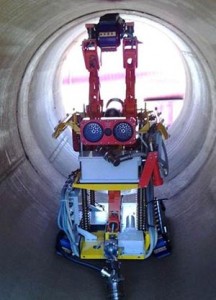From Alyeska:

This is a tale of perfect timing and imperfect piping, insistent independence and trusted teamwork, hundreds of hurdles and millions in savings, a simple Russian robot and a seismic company culture shift.
This is the story of the Robotic Inline Inspection Tool Team, which received Alyeska’s 2015 Atigun Award for Innovation. The seven team winners, and the dozens of individuals, teams and organizations that supported the effort, were all integral in a game-changing three-year journey that led to the world’s first crawler pig integrity inspection of a liquid pipeline: the Trans-Alaska Pipeline System, known as TAPS.
In the summer of 2014, a 200-pound Russian-owned robotic crawler pig inspected around 850 feet of 36 inch buried TAPS piping at Pump Station 3, providing a level of clarity on its system integrity that was previously inaccessible. The success of that inspection resulted in reduced risk and significant cost savings for Alyeska and TAPS. It also inspired similar inspections – as well as similar cost savings and risk reduction – in 2015 and the years ahead.
“There were so many people and teams involved; we all did our jobs, and we did our jobs well,” said Bhaskar Neogi, Alyeska Senior Director of Risk and Compliance. “But this was also about luck, perseverance, stubbornness not to give up, and a willingness not to worry about if we failed.”
